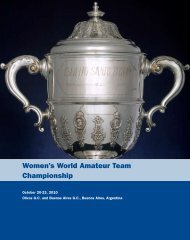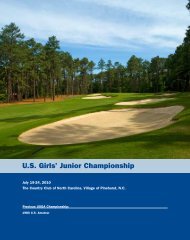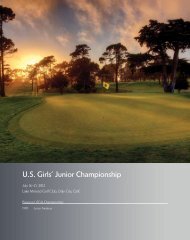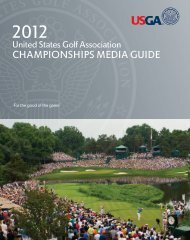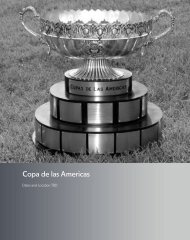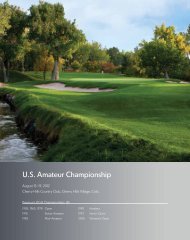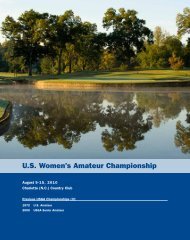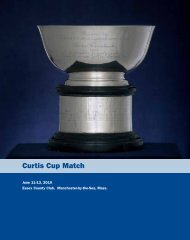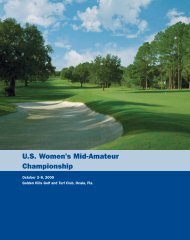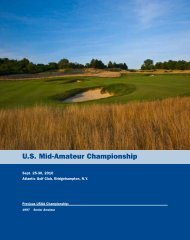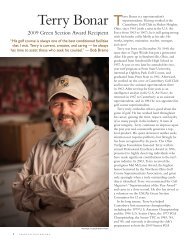- Page 1:
2012 United States Golf Association
- Page 4 and 5:
2 Table of Contents USGA Executive
- Page 6 and 7: 4 The USGA The USGA The United Stat
- Page 8 and 9: 6 The USGA GHIN (which stands for G
- Page 10 and 11: 8 USGA Museum and Arnold Palmer Cen
- Page 12 and 13: 10 Bob Jones Award Annika Sorenstam
- Page 14 and 15: 12 Joe Dey Award Stanford S. “Sta
- Page 16 and 17: 14 Herbert Warren Wind Book Award T
- Page 18 and 19: 16 USGA Green Section Award The Uni
- Page 20 and 21: 18 Ike Grainger Award The 2011 Ike
- Page 22 and 23: 20 USGA Presidents 1894-96 Theodore
- Page 24 and 25: 22 USGA Communications Staff Direct
- Page 26 and 27: 24 USGA Media Regulations We are gl
- Page 28 and 29: 26 USGA Radio/Television/Internet R
- Page 30 and 31: Curtis Cup 2010 Curtis Cup Match Ch
- Page 32 and 33: Curtis Cup 4 Curtis Cup Match The T
- Page 34 and 35: Curtis Cup 6 Curtis Cup Match Weath
- Page 36 and 37: Curtis Cup 8 Curtis Cup Match Offic
- Page 38 and 39: Curtis Cup 10 Curtis Cup Match 1952
- Page 40 and 41: Curtis Cup 12 Curtis Cup Match 1976
- Page 42 and 43: Curtis Cup 14 Curtis Cup Match 2000
- Page 44 and 45: Curtis Cup 16 Curtis Cup Match A Al
- Page 46 and 47: Curtis Cup 18 Curtis Cup Match Joh,
- Page 48 and 49: Curtis Cup 20 Curtis Cup Match U Ui
- Page 50 and 51: Curtis Cup 22 Curtis Cup Match 1932
- Page 52 and 53: 2011 U.S. Open Champion Rory McIlro
- Page 54 and 55: Open 4 U.S. Open Entries Open to an
- Page 58 and 59: Open 8 U.S. Open
- Page 60 and 61: Open 10 U.S. Open 111th U.S. Open C
- Page 62 and 63: Open 12 U.S. Open On Oct. 4, 1895,
- Page 64 and 65: Open 14 U.S. Open 1931 (July 2-4) B
- Page 66 and 67: Open 16 U.S. Open 2008 (June 12-15)
- Page 68 and 69: Open 18 U.S. Open Age Oldest Champi
- Page 70 and 71: Open 20 U.S. Open Champions Not Ret
- Page 72 and 73: Open 22 U.S. Open Lowest Score, Las
- Page 74 and 75: Open 24 U.S. Open Highest Score by
- Page 76 and 77: Open 26 U.S. Open Most Sub-Par Scor
- Page 78 and 79: Open 28 U.S. Open Holes-In-One (41)
- Page 80 and 81: Open 30 U.S. Open Exemptions for In
- Page 83 and 84: U.S. Women’s Amateur Public Links
- Page 85 and 86: Par: 36-36—72 Yardage: 6,195 36th
- Page 87 and 88: Brianna Do only led for three holes
- Page 89 and 90: Leaders Round 1 - Kelsey Vines, at
- Page 91 and 92: June 27 — July 2, 2011, Bandon Du
- Page 93 and 94: In April 1977, when entries for the
- Page 95 and 96: 2003 (June 17-22) Michelle Wie d. V
- Page 97 and 98: Oldest Champion 23 Amy Fruhwirth, 1
- Page 99 and 100: U.S. Women’s Open Championship Ju
- Page 101 and 102: Par: 36-36—72 Yardage: 6,944 Club
- Page 103 and 104: In the end, with all the weather de
- Page 105 and 106: Leaders Round 1 - Stacy Lewis, at 3
- Page 107 and 108:
U.S. Women’s Open 9 Rd.1 Rd.2 Rd.
- Page 109 and 110:
Conducted by Women’s Professional
- Page 111 and 112:
U.S. Women’s Open 13 No. Year Cha
- Page 113 and 114:
Winners of Women’s Amateur and Wo
- Page 115 and 116:
Largest 18-Hole Lead 3 Louise Suggs
- Page 117 and 118:
U.S. Women’s Open 19 Foreign-Born
- Page 119 and 120:
U.S. Amateur Public Links Champions
- Page 121 and 122:
Par: 36-35—71 Yardage: 7,717 87th
- Page 123 and 124:
Mills, 21, of Easley, S.C., became
- Page 125 and 126:
Leaders Round 1 - Devon Purser, at
- Page 127 and 128:
Ernst 3 and 2 Semifinal Round Frida
- Page 129 and 130:
The U.S. Amateur Public Links Champ
- Page 131 and 132:
1955 (July 11-16) Sam D. Kocsis d.
- Page 133 and 134:
U.S. APL Team Championship Results:
- Page 135 and 136:
Date Winner Score Site Entry 1994 (
- Page 137 and 138:
10 and 9 Arne Dokka d. Leo Zampedro
- Page 139 and 140:
U.S. Senior Open Championship July
- Page 141 and 142:
Par: 35-35—70 Yardage: 6,891 Club
- Page 143 and 144:
• Any player who has won a U.S. A
- Page 145 and 146:
Leaders Round 1 - Olin Browne, at 7
- Page 147 and 148:
Rd.1 Rd.2 Rd.3 Final Pos. Pos. Pos.
- Page 149 and 150:
1980 (June 26-29) Roberto De Vicenz
- Page 151 and 152:
Age Oldest Champion (years/months/d
- Page 153 and 154:
Most Times Host Site 2 Oakland Hill
- Page 155 and 156:
Lowest Score Under Par, First Round
- Page 157 and 158:
5 strokes Gary Player (74-70-71-73)
- Page 159 and 160:
*Fewest Sub-Par Rounds By Field, Se
- Page 161 and 162:
Hank Cooper, 3rd hole, second round
- Page 163 and 164:
U.S. Girls’ Junior Championship J
- Page 165 and 166:
Par: 36-36—72 Yardage: 6,291 Club
- Page 167 and 168:
Ariya Jutanugarn, 15, of Thailand,
- Page 169 and 170:
Leaders Round 1 - Ariya Jutanugarn,
- Page 171 and 172:
July 18-23, Olympia Fields (Ill.) C
- Page 173 and 174:
The U.S. Girls’ Junior Championsh
- Page 175 and 176:
1982 (Aug. 9-14) Heather Farr d. Ca
- Page 177 and 178:
25 holes Victoria Tanco d. Ariya Ju
- Page 179 and 180:
U.S. Junior Amateur Championship Ju
- Page 181 and 182:
Par: 36-36—72 Yardage: 7,147 Club
- Page 183 and 184:
Jordan Spieth, 17, of Dallas, Texas
- Page 185 and 186:
Leaders Round 1 - Beau Hossler and
- Page 187 and 188:
July 18-23, 2011, Gold Mountain Gol
- Page 189 and 190:
In 1948, the USGA inaugurated the U
- Page 191 and 192:
1982 (July 27-31) Rich Marik d. Tim
- Page 193 and 194:
9 and 8 Mitch Allenspatch d. Michae
- Page 195 and 196:
U.S. Women’s Amateur Championship
- Page 197 and 198:
Par: 36-36—72 Yardage: 6,386 Mail
- Page 199 and 200:
Defending champion Danielle Kang, 1
- Page 201 and 202:
Leaders Round 1 - Jihee Kim, at 5-u
- Page 203 and 204:
Aug. 8-14, 2011, Rhode Island Count
- Page 205 and 206:
The U.S. Women’s Amateur Champion
- Page 207 and 208:
1926 (Sept. 27 - Oct. 2) Helen Stet
- Page 209 and 210:
1996 (Aug. 5-10) Kelli Kuehne d. Ma
- Page 211 and 212:
Winners of U.S. Girls’ Junior and
- Page 213:
67 Jennifer Song, first round, Croo
- Page 216 and 217:
2011 U.S. Amateur Champion Kelly Kr
- Page 218 and 219:
Amateur 4 U.S. Amateur Entries Open
- Page 220 and 221:
Amateur 6 U.S. Amateur
- Page 222 and 223:
Amateur 8 U.S. Amateur Qual. Score
- Page 224 and 225:
Amateur 10 U.S. Amateur 132 Gregor
- Page 226 and 227:
Amateur 12 U.S. Amateur The U.S. Am
- Page 228 and 229:
Amateur 14 U.S. Amateur 1928 (Sept.
- Page 230 and 231:
Amateur 16 U.S. Amateur 1999 (Aug.
- Page 232 and 233:
Amateur 18 U.S. Amateur Age Oldest
- Page 234 and 235:
Amateur 20 U.S. Amateur Longest Fin
- Page 237 and 238:
USGA Senior Women’s Amateur Champ
- Page 239 and 240:
Par: 37-37—74 Yardage: 6,220 Mail
- Page 241 and 242:
Terri Frohnmayer, 55, of Salem, Ore
- Page 243 and 244:
Leaders Round 1 — Lisa Schlesinge
- Page 245 and 246:
Sept. 10-15, 2011, The Honors Cours
- Page 247 and 248:
The USGA Senior Women’s Amateur C
- Page 249 and 250:
1999 (Sept. 14-19) Carol Semple Tho
- Page 251 and 252:
69 Toni Wiesner, Sunriver (Ore.) Re
- Page 253 and 254:
U.S. Mid-Amateur Championship Sept.
- Page 255 and 256:
Conway Farms Golf Club Par: 35-36
- Page 257 and 258:
Fifteen years after losing in the c
- Page 259 and 260:
Leaders Round 1 - Paul Simson, at 5
- Page 261 and 262:
Sept. 17-22, 2011, Shadow Hawk G.C.
- Page 263 and 264:
79sh-77th; Kenny Kowall, Parma, Ohi
- Page 265 and 266:
1981 (Oct. 10-15) Jim Holtgrieve d.
- Page 267 and 268:
Companion Courses Used for Stroke-P
- Page 269 and 270:
5 and 4 Bob Lewis d. Gordon Brewer,
- Page 271 and 272:
USGA Men’s State Team Championshi
- Page 273 and 274:
Par: 35-35—71 Yardage: 6,932/6,96
- Page 275 and 276:
The gigantic smile on Bryan Norton
- Page 277 and 278:
9th USGA Men’s State Team Champio
- Page 279 and 280:
USGA Men’s State Team 9 Position
- Page 281 and 282:
Position Rd . 1 Rd . 2 Rd . 3 Total
- Page 283 and 284:
2001 (Sept . 23-25) hazeltine Natio
- Page 285 and 286:
Most Victories Champions 3 Texas (1
- Page 287 and 288:
Women’s World Amateur Team Champi
- Page 289 and 290:
25th Women’s World Amateur Team C
- Page 291 and 292:
Korea broke the record for the lowe
- Page 293 and 294:
October 20-23, 2010 Olivos Golf Clu
- Page 295 and 296:
Women’s World Amateur Team 9 Posi
- Page 297 and 298:
T30 T47 47 46 GuATEMALA . . . . . .
- Page 299 and 300:
1964 (Oct . 1-4) St . Germain G .C
- Page 301 and 302:
1980 (Oct . 1-4) Pinehurst (N .C .)
- Page 303 and 304:
1996 (Nov . 7-10) St . Elena G .C .
- Page 305 and 306:
2008 (Oct . 8-11) The Grange G .C .
- Page 307 and 308:
Largest Margin of victory, Team 21
- Page 309 and 310:
152 Australia, Saujana G. & C.C. (P
- Page 311 and 312:
70 Hyun-Soo Kim, Korea, second roun
- Page 313 and 314:
A Anschutz, Jody Rosenthal 1984 b B
- Page 315 and 316:
USGA Senior Amateur Championship Se
- Page 317 and 318:
Par: 36-35—71 Yardage: 6,851/6,91
- Page 319 and 320:
Louis Lee, 55, of Heber Springs, Ar
- Page 321 and 322:
Leaders Round 1 - Mark Bemowski, at
- Page 323 and 324:
Sept. 10-15, 2011, Kinloch G.C., Ma
- Page 325 and 326:
The remarkable growth of senior gol
- Page 327 and 328:
1985 (Sept. 30 - Oct. 5) Lewis W. O
- Page 329 and 330:
8 and 7 Frederick Kask d. Dick Chri
- Page 331 and 332:
World Amateur Team Championship Oct
- Page 333 and 334:
Antalya G.C. (PGA Sultan Course) Pa
- Page 335 and 336:
Johann Lopez-Lazaro and Alexander L
- Page 337 and 338:
27th World Amateur Team Championshi
- Page 339 and 340:
World Amateur Team 9 Position Rd. 1
- Page 341 and 342:
World Amateur Team 11 Position Rd.
- Page 343 and 344:
The idea of a World Amateur Team Ch
- Page 345 and 346:
1964 (Oct. 7-10) Olgiata G.C., Rome
- Page 347 and 348:
1976 (Oct. 13-16) Penina G.C., Port
- Page 349 and 350:
1990 (Oct. 25-28) Christchurch G.C.
- Page 351 and 352:
2000 (Aug. 31 - Sept. 3) Sporting C
- Page 353 and 354:
2008 (Oct. 16-19) The Grange G.C. (
- Page 355 and 356:
est Comeback by Winner, Final Round
- Page 357 and 358:
625 united States of America, Capil
- Page 359 and 360:
140 united States of America, Sauja
- Page 361 and 362:
Lowest Score, Individual, Third Rou
- Page 363 and 364:
A Alexander, Stewart “Buddy” 19
- Page 365:
jim vernon, 2012 World Amateur Team
- Page 368 and 369:
Women’s Mid-Amateur Women’s Mid
- Page 370 and 371:
Women’s Mid-Amateur 4 U.S. Women
- Page 372 and 373:
Women’s Mid-Amateur 6 U.S. Women
- Page 374 and 375:
Women’s Mid-Amateur 8 U.S. Women
- Page 376 and 377:
Women’s Mid-Amateur 10 U.S. Women
- Page 378 and 379:
Women’s Mid-Amateur 12 U.S. Women
- Page 380 and 381:
Women’s Mid-Amateur 14 U.S. Women
- Page 382 and 383:
2011 Walker Cup Champion Great Brit
- Page 384 and 385:
Walker Cup 4 Walker Cup Match The T
- Page 386 and 387:
Walker Cup 6 Walker Cup Match Weath
- Page 388 and 389:
Walker Cup 8 Walker Cup Match The W
- Page 390 and 391:
Walker Cup 10 Walker Cup Match 1932
- Page 392 and 393:
Walker Cup 12 Walker Cup Match 1963
- Page 394 and 395:
Walker Cup 14 Walker Cup Match 1987
- Page 396 and 397:
Walker Cup 16 Walker Cup Match 2011
- Page 398 and 399:
Walker Cup 18 Walker Cup Match USA
- Page 400 and 401:
Walker Cup 20 Walker Cup Match A Aa
- Page 402 and 403:
Walker Cup 22 Walker Cup Match Grac
- Page 404 and 405:
Walker Cup 24 Walker Cup Match Moor
- Page 406 and 407:
Walker Cup 26 Walker Cup Match Will
- Page 408 and 409:
Walker Cup 28 Walker Cup Match Chri
- Page 410 and 411:
Walker Cup 30 Walker Cup Match Kepp
- Page 412 and 413:
Walker Cup 32 Walker Cup Match Scot
- Page 414 and 415:
Walker Cup 34 Walker Cup Match USA
- Page 416 and 417:
Walker Cup 36 Walker Cup Match 1922
- Page 419 and 420:
USGA Women’s State Team Champions
- Page 421 and 422:
Par: TBD Yardage: TBD 10th USGA Wom
- Page 423 and 424:
Georgia, behind the stellar perform
- Page 425 and 426:
Ninth USGA Women’s State Team Cha
- Page 427 and 428:
USGA Women’s State Team 9 Positio
- Page 429 and 430:
The USGA Women’s State Team Champ
- Page 431 and 432:
2001 (Sept . 23-25) Woodhill C .C .
- Page 433 and 434:
Most victories Champions 3 Georgia
- Page 435 and 436:
Copa de las Americas Dates and loca
- Page 437 and 438:
TBD Par: TBD Yardage: TBD Club Admi
- Page 439 and 440:
Leaders Round 1 — Argentina, at 3
- Page 441 and 442:
7 PUeRTO RICO 154 148 145 146 593 R
- Page 443 and 444:
Championship Results: 2003 to 2010
- Page 445 and 446:
All-Time Total Medals Won (Overall,
- Page 447:
2003 Mary Bea Porter-King 2005 Lore
- Page 450 and 451:
Superlatives 2 USGA Superlatives Al
- Page 452 and 453:
4 USGA Superlatives Women’s Open;
- Page 454 and 455:
6 National Champions A Abbott, B. P
- Page 456 and 457:
8 National Champions Castillo, Lori
- Page 458 and 459:
10 National Champions Fruhwirth, Am
- Page 460 and 461:
12 National Champions Jackson, Kath
- Page 462 and 463:
14 National Champions Name Total Ye
- Page 464 and 465:
16 National Champions Palmer, Ray 1
- Page 466 and 467:
18 National Champions Name Total Ye
- Page 468 and 469:
20 National Champions Name Total Ye
- Page 470 and 471:
22 Foreign-Born National Champions
- Page 472 and 473:
24 Foreign-Born National Champions
- Page 474 and 475:
26 Host States and Clubs ALABAMA (4
- Page 476 and 477:
28 Host States and Clubs State & Cl
- Page 478 and 479:
30 Host States and Clubs State & Cl
- Page 480 and 481:
32 Host States and Clubs State & Cl
- Page 482 and 483:
34 Host States and Clubs State & Cl
- Page 484 and 485:
36 Host States and Clubs State & Cl
- Page 486 and 487:
38 Host States and Clubs State & Cl
- Page 488 and 489:
40 Host States and Clubs State & Cl
- Page 490 and 491:
42 Host States and Clubs State & Cl
- Page 492 and 493:
44 Host States and Clubs State & Cl
- Page 494 and 495:
46 Future Championships Chart USGA
- Page 496:
48 2012 Championships Photography:



